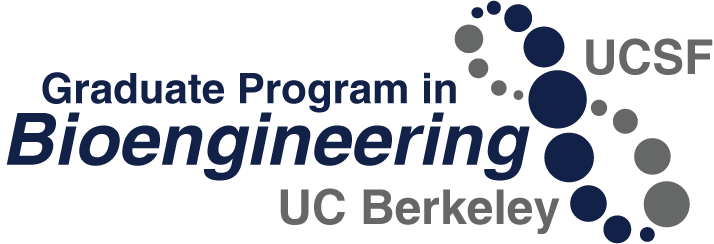Learn more about Thomas Carey’s work developing a microfluidic-based platform to detect the presence of biomarkers present in virtually every fluid, particularly saliva. Carey won the 2018 Early Innovator Award at the Molecular Medicine Tri Conference for this research.
BioE alumni on different continents win grant to to see molecular structure of membraneless organelles
Bioengineering PhD alumni Nick Fawzi and Sapun Parekh started a conversation about something completely different and ended up with a grant from the Human Frontier Science Program to study membraneless organelles.
Retraining the brain’s vision center to take action
Researchers led by UC Berkeley Professor and member of the graduate program Jose Carmena have demonstrated the astounding flexibility of the brain by training neurons that normally process input from the eyes to develop new skills, in this case, to control a computer-generated tone.
Prof Edward Chang in “Rebooting Kimberly’s Brain”
UCSF Bioengineering program faculty and neurosurgeon Edward Chang is part of the team unlocking new ways of treating epilepsy and mental health, featured in this news video about innovative treatments at UCSF.
Desai Lab diabetes startup featured on NPR
Encellin, a biotech startup formed from research in Professor Tejal Desai’s lab at UCSF, may have engineered and insulin-releasing implant to manage type-1 diabetes.
Roy Lab artificial kidney featured on Wired
Learn more about Professor Shuvo roy’s artificial implantable kidney.
Shuvo Roy Receives $2.4M NIH Grant for Bioartificial Pancreas
The project focuses on using silicon nanopore membranes as an immunoisolation barrier to protect stem-cell derived insulin producing cells from pro-inflammatory attack, while ensuring physiologic oxygenation and glucose-insulin kinetics. Data supporting the grant application was developed by BioE PhD student Shang Song.
Kumar lab sheds new light on cellular stress fiber networks
New research from Professor Sanjay Kumar’s lab uncovers fundamental design principles of how cells and tissues define and maintain their structure, combining sophisticated micropatterning technologies to engineer cell shape, laser nanosurgery to cut individual stress fibers with light and probe their internal structure, and mathematical modeling. Cell shape is critical in development, wound healing, stem cell differentiation, and cancer, among other processes. The lead author is bioengineering PhD student Elena Kassianidou.
Maharbiz and Carmena create implantable neural dust
Messersmith lab featured on CBS news
Tejal Desai featured on CBS News
BioE alum and UCSF professor Tejal Desai was featured on the evening news for her lab’s work to create a tiny implantable nanostructures that will monitor blood sugar and secrete and dispense insulin for diabetics.
Full Lab designs robot inspired by cockroach locomotion
Members of UC Berkeley integrative biology professor Bob Full’s lab have designed a cockroach-inspired robot that can squeeze through the tiniest cracks and run at high speeds even when flattened. Full and recent PhD Kaushik Jayaram will publish their findings this month in the early online edition of the journal Proceedings of the National Academy of Sciences.
Zheng, Conolly, Schaffer achieve first in vivo magnetic particle imaging
Professor Steven Conolly’s lab is the first in the world to achieve cell tracking in vivo by magnetic particle imaging.
Roy lab awarded $6M for implantable bioartificial kidney
A new $6 million grant from the National Institute of Biomedical Imaging and Bioengineering has been awarded to UCSF Professor Shuvo Roy and colleagues for their work on a surgically implantable, artificial kidney.
BioE leads new UC Tissue Regeneration Resource Center
Bioengineering graduate faculty Kevin Healy (UC Berkeley) and Jeffrey Lotz (UCSF) are among the leaders of the new University of California Tissue Regeneration Resource Center, a partnership between UCSF, UC Berkeley, and UC Davis. The center was established through a grant from the National Institute of Dental and Craniofacial Research (NIDCR).
Herr Lab featured at US Patent celebration
Amy Herr’s lab will be a Featured Innovator at a celebration of the opening of the new Silicon Valley Regional U.S. Patent and Trademark Office, hosted by the Silicon Valley Leadership Group.
Gartner builds human breast tissue, cell by cell
This story and video focuses on Professor Zev Gartner’s efforts to build fully functioning 3-D human tissue, cell by cell.
Major Innovation in Molecular Imaging Delivers Spatial and Spectral Info Simultaneously
Graduate faculty member Ke Xu has invented a new technology to image single molecules with unprecedented spectral and spatial resolution, thus leading to the first “true-color” super-resolution microscope.
Another Milestone in Hybrid Artificial Photosynthesis
Graduate faculty member Michelle Chang collaborated on a major new milestone in developing a bioinorganic hybrid approach to artificial photosynthesis.
Faculty Perspective: Cancer, Cultures, and Personalized Medicine
A conversation with Professor Sanjay Kumar about the technologies still needed to enable the future of medicine. This is the first in a series of interviews with faculty members about the hot developments and unmet needs in their fields.
Anderson lab develops potential molecular lock and key for GMOs
Researchers in bioengineering professor Chris Anderson’s lab have used synthetic biology to develop an easy way to lock down bacteria, to contain its accidental spread. The work, led by recent BioE Ph.D. Gabriel Lopez, shows promise as a potential method of containing advances created through synthetic biology and genetic engineering.
Bioengineers receive $3.2 million for visionary retina research
Austin Roorda, UC Berkeley professor of optometry and vision science and member of the graduate program, is lead investigator on an ambitious new project to map the interaction of retinal cells in an effort to better understand how visual data is processed before it is sent to the brain. The research is funded by the National Eye Institute’s Audacious Goals Initiative.
New breakthrough in artificial photosynthesis
Professor Michelle Chang, member of the graduate program in bioengineering and UC Berkeley professor of chemistry, is one of the lead researchers developing a hybrid system of semiconducting nanowires and bacteria that mimics the natural photosynthetic process.
‘Smart bandage’ detects early bedsores
A team of researchers, including UC Berkeley professor Michel Maharbiz and UCSF professor Shuvo Roy, have developed new sensor-packed “smart bandages” that actually detect damage to the skin before it becomes visible, allowing caregivers to prevent the formation of infection-prone bedsores.
